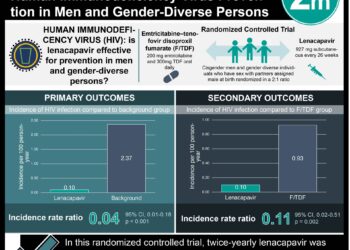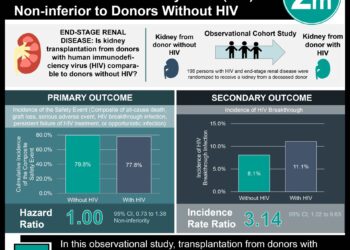Adjunctive dexamethasone in HIV-cryptococcal meningitis linked with increased morbidity and mortality: The CryptoDex study
1. Adjunctive dexamethasone for HIV-associated cryptococcal meningitis did not reduce mortality.
2. Adjunctive dexamethasone for HIV-associated cryptococcal meningitis was associated with more adverse events and disability compared to placebo.
Evidence Rating Level: 1 (Excellent)
Study Rundown: HIV-associated cryptococcal meningitis causes approximately 600,000 deaths each year. For certain CNS infections, such as bacterial meningitis, glucocorticoids as adjunctive therapy has shown some benefits. Such benefit is believed to be derived from a reduction in ICP and inflammation. In general, there is little data on the effects of glucocorticoids in HIV-associated cryptococcal meningitis. In this randomized, double-blind, placebo-controlled study, researchers found that adjunctive dexamethasone therapy in HIV-cryptococcal meningitis was associated with significantly increased mortality and disability, more adverse events and a slower decline in CSF counts of infection compared with the placebo group.
Click to read the study in NEJM
Relevant Reading: Dexamethasone in Vietnamese adolescents and adults with bacterial meningitis
In-Depth [randomized controlled trial]: In this double-blind, randomized placebo-controlled trial, researchers evaluated the effect of adjunctive dexamethasone on the morbidity and mortality of patients with HIV-associated cryptococcal meningitis. A total of 451 patients from 13 hospitals in Indonesia, Laos, Thailand, Vietnam, Malawi and Uganda were enrolled with 224 and 227 patients assigned to the dexamethasone and placebo groups respectively. The primary outcome was survival at 10 weeks after randomization. Notable secondary outcomes included disability (ranked as good, intermediate, poor or death) at 10 weeks and 6 months, visual acuity at 10 weeks, cryptococcal CSF counts and change in opening pressure during the first two weeks.
At 10 weeks, 47% in the dexamethasone group vs. 41% in the placebo group had died. While the initial intention-to-treat analysis showed no significant differences in the primary outcome (HR for death in dexamethasone group=1.11; 95%[CI] = 0.84-1.47; p=0.45), an exploratory analysis stratifying deaths by months showed significant differences in death between days 44-71 (HR=2.50, 95%[CI]=1.23-5.05; p=0.01). Disability at 10 weeks and 6 months was significantly associated with dexamethasone (10 weeks OR of 0.43; 95%[CI]=0.25-0.69; p<0.001; and 6 months OR=0.49; 95%[CI]=0.31-0.77; p=0.002). The rate of decline in CSF counts of infection per day was −0.21 log10 colony-forming units per milliliter in the dexamethasone group vs −0.31 log10 colony-forming units per milliliter in the placebo group (P<0.001). Additionally, at 6 months, there were 667 clinical adverse events in the dexamethasone group and 494 in the placebo group (p=0.01). After approximately 18 months, the clinical trial was stopped over concern that dexamethasone was causing harm in multiple outcomes categories.
Image: PD/CDC
©2016 2 Minute Medicine, Inc. All rights reserved. No works may be reproduced without expressed written consent from 2 Minute Medicine, Inc. Inquire about licensing here. No article should be construed as medical advice and is not intended as such by the authors or by 2 Minute Medicine, Inc.







